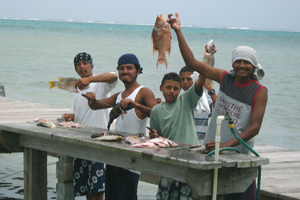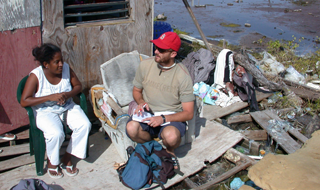In the time away from her anthropological research, Susan Stonich engages in a familiar and common hobby – “I’m a weaver.”
“The creative part of my life is weaving and textile design, I’m very interested in that,” she said.
But the nature of weaving, interlacing different threads to create a larger, coherent fabric, is integral to understanding Stonich’s career as an anthropological researcher and political ecologist. “I really do research that tends to integrate all those previously diverse fields.”
At the core of both Stonich’s research and pedagogical approach is a belief in the value and necessity of interdisciplinary perspectives. “We have to do a better job from the undergraduate level to the graduate level to train our students to be truly interdisciplinary,” she explained. “Because of the kinds of problems that I look at in my work, an interdisciplinary approach is really necessary.”
This academic diversity is also represented in Stonich’s personal academic history, as she majored in mathematics with a minor in English and pursued graduate work in computer science before coming to UK to get her master’s degree and doctorate in anthropology.“My own training and experience has been pretty interdisciplinary, and that has been able to really help me from the beginning,” Stonich said.
Now focusing her research on issues of sustainable economic development and climate change in the Mesoamerican Barrier Reef System, Stonich says that the time she spent at UK was fundamental for her career. “I became an anthropologist at Kentucky. I think that I got the best training and the best education in applied anthropology that you could get anywhere in the U.S. and probably beyond,” Stonich boasted.
View map of the Mesoamerican Reef System

Cleaning the Day's Catch, Placencia, Belize.
For Stonich, however, the benefits of her graduate work at UK also extended beyond her research and training. “Our cohort of graduate students was so supportive of each other, it was the best sort of collaborative effort you could ever wish to have,” she said.Stonich has remained friends with many of her colleagues and considers her graduate experience special because she was able to be part an atmosphere of such professional and personal support.
On Oct. 16, 2009, Stonich will return to the University of Kentucky for the first time since her graduation to deliver a talk entitled, "Confronting Contradictions between Development and Conservation in a Time of Climate Change: the Mesoamerican Reef System” as a part of the 2009-2010 colloquium series for the Department of Anthropology. Her presentation is based on the results of the current research project, funded by the National Oceanic and Atmospheric Administration (NOAA), she is co-directing with Dr. Sara Alexander of Baylor University, a member of Stonich’s graduate student cohort and also a UK graduate.

Steve Cole, a graduate student on Stonich's research team, interviewing woman household head in San Mateo, Ambergris Cay, Belize.
Stonich’s current research endeavors in Central America are a direct result of the work she did as a graduate student at UK. “The problems that confronted me when I was at Kentucky in the field, especially around my master’s thesis research, have really been the basis and the foundation for all the things that have happened subsequently,” Stonich said.
Starting as a descriptive folk life study in the Big South Fork River and Recreation Area, Stonich’s master’s research opened her eyes to how local communities were affected by economic development and efforts of coercive conservation. Stonich then saw similar dynamics and crises building in Central America and took a research opportunity that allowed her to study agricultural development.
As populations and economic efforts began to shift to the coast due to the expansion of tourism and aquaculture such as shrimp farming, however, Stonich’s research also shifted to the consequences of unsustainable development.“I got really involved with local communities and local people about trying to do something to better control their destiny and what they were able to do,” Stonich explained.
One of the goals of Stonich’s research involves finding solutions for local communities to help them survive in the evolving economic and ecological landscape. “Our project has been looking at the vulnerability and resistance of local people in communities to these multiple stressors, and trying to identify those kinds of positive strategies and helping people adapt these changes and become more resilient.”
Newer issues such as climate change have also affected Stonich’s current research.“There are multiple crises going on in the Mesoamerican Reef, now including the significant impacts of climate change, and not only major events like hurricanes and sea level rise but also changes in weather patterns,” she explained.
This is just one of the many factors Stonich must consider in order to understand the relationship between humans and natural systems in such fragile and ecologically diverse areas.
Stonich’s work benefits from her interdisciplinary perspective and her political ecology approach.
“Political ecology does exactly what is being called for, and that is to look at these environmental consequences and effects in their larger social and cultural and political contexts,” she said. This interconnectivity allows Stonich to focus on “how these inequalities are related to what is going on in a larger geopolitical and ecological scale.”
Her presentation on Oct. 16 will be a discussion of the details of this project and how Stonich plans on using her research to find new solutions for the crises facing the Mesoamerican Barrier Reef System.
“Our goal is to take the research design and methodologies we developed in this first phase and apply them in a larger, more comparative fashion.” Stonich’s research, from UK to Big South Fork and now to the Mesoamerican Reef, shows how much the world can benefit such an interdisciplinary, interwoven approach.
Photos and map courtesy of Susan Stonich
